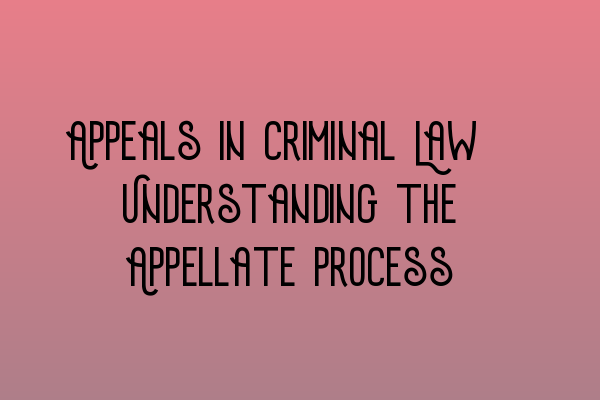Appeals in Criminal Law: Understanding the Appellate Process
The criminal justice system is designed to provide a fair and just resolution to criminal cases. While the initial trial and verdict are crucial, sometimes mistakes or injustices can occur. In such cases, the option of making an appeal exists, offering an opportunity to challenge the decision made in a criminal case.
Understanding the appellate process can be complex, but it is essential for anyone involved in criminal law. Whether you are a defendant seeking to overturn a conviction or a lawyer representing a client, knowing the intricacies of appeals can make a significant difference in obtaining justice.
The Grounds for Appeal
Before delving into the appellate process, it is crucial to understand the grounds on which an appeal can be based. Common grounds for appeal include:
- Newly discovered evidence that could potentially impact the verdict.
- Errors in the application of the law during the trial.
- Procedural errors that may have affected the fairness of the trial.
- Lack of sufficient evidence to support the conviction.
These grounds provide a basis for arguing that the trial court’s decision was flawed and should be overturned.
The Appellate Process
The appellate process involves several stages and requires the involvement of competent legal professionals who specialize in criminal appeals. Here is a general overview of the process:
- Notice of Appeal: The first step in initiating an appeal is filing a notice of appeal. This document signals the intent to challenge the trial court’s decision and sets the appellate process in motion.
- Record Preparation: The appellate court relies on the record from the trial court to review the case. This includes transcripts of the trial proceedings, exhibits, and other relevant documentation.
- Written Briefs: Both the appellant (the party appealing) and the appellee (the opposing party) submit written briefs outlining their arguments and legal authorities. These briefs present the parties’ positions on the issues raised in the appeal.
- Oral Arguments: In some cases, the appellate court may allow the parties to present oral arguments. This provides an opportunity to further support their positions and answer questions from the appellate judges.
- The Appellate Decision: Once all the necessary information has been reviewed, the appellate court issues its decision. The court may choose to affirm the trial court’s decision, reverse it, remand the case for further proceedings, or grant other appropriate relief.
It is important to note that the appellate process can vary depending on the jurisdiction. Each jurisdiction may have specific rules and procedures that must be followed.
Working with an Appellate Lawyer
Given the complexity of the appellate process, working with an experienced appellate lawyer is crucial. An appellate lawyer specializes in handling appeals and can navigate the intricacies of the appellate system effectively.
Whether you are the appellant seeking to overturn a conviction or the appellee defending against an appeal, an appellate lawyer can:
- Review the trial court record for errors or issues that can be raised on appeal.
- Research and draft persuasive legal briefs supporting your position.
- Present oral arguments before the appellate court, if permitted.
- Provide guidance and advice throughout the entire appellate process.
Working with a skilled appellate lawyer maximizes your chances of a successful appeal and ensures that your arguments receive the consideration they deserve.
Conclusion
Understanding the appellate process is a crucial aspect of criminal law. Appeals allow for an impartial review of trial court decisions and provide an opportunity to correct any errors or injustices that may have occurred during the initial trial.
If you are considering an appeal or need assistance with the appellate process, it is highly recommended to work with an experienced appellate lawyer from SQE Criminal Law & Practice Law UK. Our team of skilled professionals has a deep understanding of criminal appeals and can provide the expertise needed to navigate the appellate system effectively.
To further enhance your understanding of SQE-related topics, we recommend checking out these related articles:
- SQE 1 Practice Exam Questions
- SQE 1 Practice Mocks FLK1 FLK2
- SQE 2 Preparation Courses
- SQE 1 Preparation Courses
- SRA SQE Exam Dates
Feel free to explore these resources to further expand your knowledge and better prepare for your legal journey.
